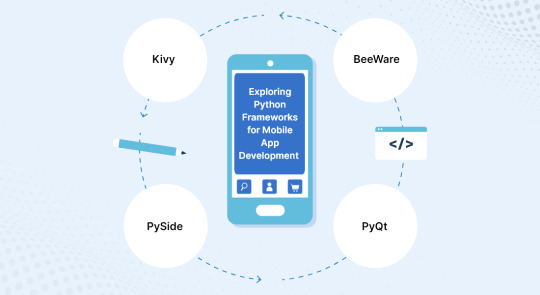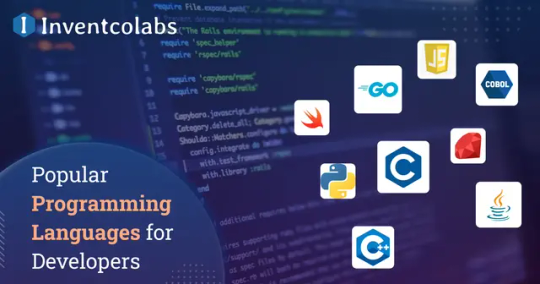#Python Mobile App Development
Explore tagged Tumblr posts
Text
Top Benefits of Developing Cross-Platform Mobile Apps Using Python

Discover the top benefits of developing cross-platform mobile apps using Python. Learn how Python streamlines app development, enhances performance, reduces costs, and provides flexibility for creating scalable apps across multiple platforms. Visit now to read more: Top Benefits of Developing Cross-Platform Mobile Apps Using Python
#python mobile app development#python mobile development#mobile app development with python#python mobile app framework#python for mobile apps#python mobile app frameworks#python mobile app development framework#python framework for mobile app development#cross platform app development with python#python for mobile app development#best python framework for app development#mobile application development with python#best python framework for mobile app development#cross platform app development python#Cross-platform app development#Cross-platform mobile app development#developing mobile apps using python#mobile app python framework#mobile apps with python#python cross platform app development#python cross platform mobile app
0 notes
Text
Python Frameworks for Mobile App Development and its Benefits

Python’s fame is expanding as of late because of its usability, transparency, and various arrangement of modules and structures. Many experts in a range of industries, including web development, data science, and artificial intelligence, presently favor it. Because of systems like Kivy, BeeWare, and PySide, Python has additionally arisen as a suitable choice for planning portable applications.
Python’s adaptability to adjust to various languages widens its utilization in the portable application improvement business. This guide dives into Python’s abilities for making imaginative and productive versatile applications, like structures, libraries, and integration strategies.
Let’s take a deep dive into Python for Mobile App Development in 2023.

Benefits of Using Python for Mobile App Development
Python is a strong programming language that can be utilized for various undertakings, including mobile app development.
It is reasonable for cross-stage portable application improvement since it upholds a few platforms, including iOS and Android.
Python can be utilized to make an extensive variety of mobile apps, including utility applications, social media apps, e-commerce apps, data analysis apps, and others.
It provides developers with opportunities and choices by giving an expansive ecosystem of libraries, frameworks, and instruments that take special care of different portable application improvement requests.
Python is effectively coordinated with different languages and technologies, developers, and engineers to use existing codebases and frameworks and expand the improvement cycle’s flexibility.
The language underlines code comprehensibility by characterizing code lumps with space and whitespace, bringing about better-coordinated and outwardly satisfying code.
Exploring Python Frameworks for Mobile App Development
Python provides a number of frameworks for mobile app development that assist to smooth out the advancement of interaction and increment productivity. Kivy, an open-source Python library that permits the development of cross-stage applications for Android, iOS, Windows, and different stages, is one striking system.
Kivy’s solidarity is its capacity to make outwardly engaging and responsive UIs utilizing various gadgets and designs.
BeeWare is one more well-known choice, as it permits engineers to use Python to make local UIs for versatile applications. BeeWare utilizes every stage’s local APIs to give a smooth and superior presentation client experience.
Moreover, systems, for example, PySide and PyQt offer ties to the eminent Qt structure, permitting engineers to serious areas of strength for making highlight-rich portable applications.
Best Practices and Tips for Python Mobile App Development
To ensure a good outcome while planning portable applications with Python, best practices should be followed.
To start, picking a suitable cross-stage structure, like Kivy or BeeWare, empowers code reuse, saving time and exertion.
Profiling code and focusing on urgent segments increment application execution and responsiveness.
Powerful blunder taking care of, investigating apparatuses, and unit testing all add to expanded dependability.
Focusing on UI/UX contemplations through the use of versatile explicit structures and client testing ensures a refined client experience.
Client information is safeguarded by areas of strength for executing elements like confirmation and secure correspondence conventions.
Future Trends and Developments in Python Mobile App Development
Python mobile app development is predicted to see various trends and developments in the future that will affect the industry. Cross-platform software development frameworks such as Kivy, BeeWare, and PySide are becoming increasingly popular.
These frameworks enable developers to write code once and publish it across various platforms, such as iOS and Android, saving time and resources. Another notable advancement is Python’s interaction with new technologies such as artificial intelligence (AI) and machine learning (ML).
Developers may quickly include complex capabilities such as natural language processing, computer vision, and predictive analytics into their mobile applications using frameworks such as TensorFlow and PyTorch.
Furthermore, the advent of low-code and no-code platforms will allow non-technical workers to construct mobile apps in Python with little coding skills.
Conclusion
Python’s strong community support and availability of resources make it an accessible choice for both beginners and experienced developers. Embracing Python for mobile app development in 2023 enables developers to tap into its vast potential and create innovative and feature-rich applications that cater to the evolving needs of mobile users.
Read More Python Frameworks for Mobile App Development and its Benefits
0 notes
Text
Explore the innovative software development services offered by Software Development Hub (SDH). From MVP development and AI-powered solutions to ERP software, IoT, and cloud migration, SDH delivers cutting-edge expertise for startups and businesses worldwide. Discover insights, project highlights, and tips on building user-centric applications and driving digital transformation.
#software development#web app development#mobile app development#artificial intelligence#saas development company#custom app development#product development#erp software#enterprise software#python#machine learning development#IoT and IIoT development#machine learning#api development
8 notes
·
View notes
Text

Python Isn’t Just a Language—It’s a Weapon. Learn It Loud in Kochi. 💻
You’re not here for basics. You’re here to build, break, and rebuild with purpose. At iROHUB Infotech, the Python course in Kochi is a full-throttle, no-fluff, real-world experience for those who are done playing safe. From zero to pro, you’ll write code that breathes life into automation, web apps, AI, and more — not in theory, but in the wild. You’ll work on real projects, face real challenges, and come out with skills employers actually want. This isn’t a tutorial playlist. It’s an evolution. If you’re ready to think logically and speak in Python, iROHUB is your battlefield.
Dare to code differently? This is your signal.
For more information, visit: https://www.irohub.com, [email protected]
#softwaretraininginstituteinkochi#python#ios#kochi#mobile app development#technology#tech#computer#smart tech
2 notes
·
View notes
Text

Summer Internship Program 2024
For More Details Visit Our Website - internship.learnandbuild.in
#machine learning#programming#python#linux#data science#data scientist#frontend web development#backend web development#salesforce admin#salesforce development#cloud AI with AWS#Internet of things & AI#Cyber security#Mobile App Development using flutter#data structures & algorithms#java core#python programming#summer internship program#summer internship program 2024
2 notes
·
View notes
Text
Hey there! I'm Sopgwi Yvan Armel, a 3rd-year Software Engineering student passionate about technology and innovation. I'm here to share my journey, challenges, and evolution as I work towards integrating into the professional world.
🚀 Join me as I document my daily tasks
JavaScript, typescript, Angular, flutter ,UI UX and software testing will be my focus and .I'll also be sharing helpful content to support fellow tech enthusiasts.
🎮 When I'm not coding, you'll find me gaming on FIFA, Clash Royale, and Fortnite. I'm open, cool, and speak both English and French, so feel free to connect and chat!
Let's embrace the challenges and together, explore the endless possibilities of the technological sector. Hit me up, and let's connect! 🌟
#software#100daysofcode#software engineering#programming#design#developer#success#mobile development#figmadesign#fluttercord#reactjs#online#apps#python#entrepreneur#programmer#startup#school#writing
6 notes
·
View notes
Text
Custom Software vs. Off-the-Shelf: Which Is Right for Your Business in 2025?
Custom Software Development

Introduction: Navigating the Digital Crossroads of 2025
In the dynamic digital landscape of 2025, software isn't just a tool; it's the very lifeblood of a thriving business. From streamlining daily operations and managing customer relationships to driving innovation and gaining a competitive edge, the right software empowers businesses to grow. Yet, for many business leaders like yourself, a crucial question often surfaces: should we invest in a custom software solution meticulously crafted to our unique needs, or opt for a readily available off-the-shelf package?
This isn't merely a technical decision; it's a strategic one that profoundly impacts your operational efficiency, scalability, and ultimately, your return on investment (ROI). With rapid advancements in cloud computing, AI integration, and the ever-present need for robust data security, selecting the right software solution in 2025 is more complex and critical than ever before. This in-depth guide aims to cut through the jargon, offering you clarity, practical insights, and a structured approach to making the decision that truly propels your business forward.
Understanding Off-the-Shelf Software: The "Ready-to-Wear" Solution

Imagine discovering a suit that fits you perfectly right off the rack—this is similar to off-the-shelf software. Also known as Commercial Off-The-Shelf (COTS) software, these pre-built, cloud-based tools, such as Salesforce, QuickBooks, or Asana, are designed to address common business needs. They are typically delivered as Software as a Service (SaaS) through a subscription model.
The Allure: Benefits of Off-the-Shelf Software in 2025
Rapid Deployment & Immediate Impact: This is often the biggest draw. You can subscribe today and potentially start using the software tomorrow. For businesses needing a quick solution to an immediate problem, off-the-shelf offers unparalleled speed to market. You bypass lengthy development cycles and jump straight into leveraging its capabilities.
Lower Initial Investment: Instead of a large upfront capital expenditure for development, you typically pay a recurring subscription fee (monthly or annually). This transforms a CapEx (capital expenditure) into an OpEx (operational expenditure), which can be appealing for budget-conscious organizations or startups.
Proven Reliability & Community Support: These solutions have been tried, tested, and refined by thousands, if not millions, of users. This means most major bugs have been ironed out, and the core functionalities are generally stable. Furthermore, large user communities, extensive documentation, and dedicated vendor support teams are readily available for troubleshooting and guidance.
Automatic Updates & Reduced Maintenance Burden: The vendor handles all the heavy lifting – infrastructure management, security patches, regular feature updates, and bug fixes. Your IT team can focus on other strategic initiatives, freeing them from the operational grind of software upkeep. In 2025, many off-the-shelf solutions are also automatically integrating the latest AI tools and automation capabilities, keeping you current without effort.
Access to Industry Best Practices: COTS software often embeds best practices refined over years across various businesses. This can be invaluable for standardizing processes, especially if your current workflows are less optimized.
The Reality Check: Drawbacks of Off-the-Shelf Software in 2025

Limited Customization & "One-Size-Fits-Most": This is the most common pain point. While some configuration options exist (e.g., custom fields, basic workflow adjustments), off-the-shelf software cannot be molded to perfectly fit your highly specific or unique business processes. You'll often find yourself adapting your way of working to the software's limitations, which can introduce inefficiencies and frustration.
Feature Bloat & Unused Functionality: To appeal to a wide market, these solutions pack numerous features, many of which you may never use. This "feature bloat" can lead to a cluttered interface, increased complexity for your teams, and potentially higher costs for functionalities you don't even need.
Integration Headaches: While many modern SaaS tools offer APIs (Application Programming Interfaces) for integration, achieving seamless, real-time data flow with all your existing, particularly legacy, systems can be a significant challenge. You might end up with data silos, manual data entry, or requiring expensive middleware solutions.
Vendor Lock-in & Dependency: You are inherently tied to your vendor's roadmap, pricing model, and support quality. If they increase prices significantly, discontinue a feature you rely on, or even go out of business, migrating your data and operations to a new system can be a costly, time-consuming, and disruptive nightmare.
Generic Security Posture: While reputable SaaS providers invest heavily in security, a widely used platform is a more attractive target for cyber threats. Furthermore, if your business operates in a highly regulated industry (e.g., healthcare, finance), off-the-shelf solutions might not meet all your specific compliance requirements without significant workarounds or additional tools.
No Unique Competitive Advantage: If your competitors are using the exact same software, it's difficult to differentiate your operational efficiency or unique service offerings based on your tech stack alone.
Is Off-the-Shelf Right For You If…
Your operational needs are standard and well-aligned with common industry practices?
Do you need a solution quickly to address an immediate challenge?
Your budget prioritizes lower upfront costs and predictable subscription fees.
Do you prefer delegating maintenance and updates to a third-party vendor?
Understanding Custom Software: The "Tailored" Masterpiece

Imagine ordering a bespoke suit, crafted specifically to your measurements, fabric choices, and style preferences. This concept captures the essence of custom software. Also referred to as bespoke software, tailor-made software, or custom application development, it is designed exclusively for your organization to meet its specific workflows, challenges, and strategic goals. This could range from a unique customer relationship management system tailored for your niche industry to an AI-powered internal analytics tool or a specialized inventory management system.
The Strategic Advantage: Benefits of Custom Software in 2025
Perfect Fit & Optimized Workflows: This is the paramount advantage. Custom software is designed to mirror your unique business processes, eliminating inefficiencies, manual workarounds, and data silos. It supports your way of doing business, rather than forcing you to adapt to its limitations. This hyper-optimization can dramatically boost productivity and reduce operational costs over time.
Scalability & Future-Proofing by Design: Your business is unique, and it will evolve. Custom software is built with your long-term vision in mind, ensuring it can effortlessly scale up to handle increased data volumes, user loads, or new functionalities as your business grows. You own the code and the intellectual property, granting you full control to adapt it to emerging technologies (like advanced AI models, blockchain, or quantum computing implications) and market demands, essentially future-proofing your investment.
Seamless Integration with Existing Ecosystems: From day one, your custom solution can be engineered to integrate perfectly with your existing legacy systems, third-party APIs, and modern cloud services. This creates a cohesive, unified technological ecosystem, ensuring smooth data flow and eliminating frustrating manual transfers.
Unparalleled Competitive Advantage: A bespoke solution allows you to automate proprietary processes, develop unique features, gain exclusive insights from your data, or offer an unparalleled customer experience that your competitors simply cannot replicate with generic tools. This distinct technological edge can be a powerful market differentiator.
Enhanced Security & Compliance Control: For businesses in highly regulated sectors, custom software offers unparalleled control over your security architecture. You can implement specific, granular security protocols, conduct extensive testing, and ensure strict adherence to industry-specific compliance standards (e.g., HIPAA, ISO 27001, GDPR, PCI DSS).
Full Data Ownership & Control: With custom software, you retain complete ownership and control over your data. This is crucial for privacy, analytics, and leveraging your data assets for future strategies.
Long-Term Cost Efficiency & ROI: While the initial investment is higher, custom software can lead to substantial long-term savings. You avoid recurring subscription fees, eliminate the costs associated with unused features, and gain significant efficiency improvements that directly translate into a higher ROI over its lifespan.
The Realities: Challenges of Custom Software in 2025
Higher Initial Investment: Developing a custom solution requires a substantial upfront capital outlay for design, development, rigorous testing, and initial deployment. This can be a barrier for startups or businesses with limited immediate capital.
Longer Development Cycles: From conceptualization and detailed requirements gathering to coding, testing, and deployment, the process can take several months, or even over a year, depending on the complexity of the solution. This isn't ideal if your business needs an immediate fix.
Ongoing Maintenance & Support Responsibility: Unlike off-the-shelf, you are responsible for the long-term maintenance, bug fixes, security updates, and future enhancements of your custom software. This requires either a dedicated internal IT team or a reliable, long-term partnership with a specialized software development firm.
Reliance on Development Partner: Your success hinges on selecting the right development team. A poorly chosen partner can lead to budget overruns, missed deadlines, or a final product that doesn't meet expectations. Diligent vetting is crucial.
Project Risk: Complex custom software projects carry inherent risks, including scope creep, unforeseen technical challenges, and the potential for the final product to deviate from the initial vision if requirements are not meticulously defined and managed throughout the development lifecycle.
Consider Custom Software If Your Business…
Has unique, core processes that differentiate you from competitors?
Operates in a niche or highly regulated industry with specific compliance needs?
Requires seamless, deep integration with a complex existing tech stack?
Has a clear long-term vision for scalability and adapting to future technological shifts (like advanced AI or quantum computing)?
Sees software as a strategic asset for competitive advantage, not just a utility?
Navigating the Nuances in 2025: Key Decision Factors

The "right" choice isn't universal. It hinges on a meticulous evaluation of your unique business context and future aspirations. Here are the critical factors to weigh in 2025:
Your Unique Business Needs & Workflows:
The Litmus Test: Are your primary business processes unique, complex, or a source of competitive advantage? If yes, forcing them into a generic off-the-shelf solution will likely lead to inefficiency and frustration. Custom software ensures a perfect fit. If your operations are standard (e.g., basic payroll, generic HR), COTS is often sufficient.
Budget & Total Cost of Ownership (TCO):
Beyond Upfront: Don't just look at the initial price tag. Calculate the TCO over 3-5 years. Factor in off-the-shelf subscription fees (which can escalate with more users/features), integration costs, potential workarounds, and training. For custom, include development, ongoing maintenance, and potential future upgrades. Sometimes, the long-term savings and efficiency gains of custom software outweigh its higher initial investment.
Time to Market & Urgency:
Immediate vs. Strategic: Do you need a solution deployed next week to solve a pressing issue? Off-the-shelf is your answer. If you're building a solution for future growth, competitive differentiation, or long-term efficiency, and can afford a development cycle of several months, custom software allows for precision and robustness.
Scalability & Future Growth:
Growth Trajectory: How much do you anticipate your business will grow in the next 3-5 years? Will your data volume, user base, or service offerings expand significantly? Custom software built with scalability in mind can seamlessly handle growth. Off-the-shelf solutions' scalability often means jumping to much higher, more expensive tiers, or hitting hard limits.
Integration with Existing Systems:
The Data Ecosystem: Do you rely heavily on multiple existing software systems (e.g., ERP, CRM, marketing automation, legacy databases)? If seamless, real-time data flow between all these systems is critical for your operations and decision-making, custom integration capabilities are paramount. While many COTS offer integrations, they might not cover all your niche or legacy systems without complex middleware.
Security & Compliance Requirements:
Regulatory Landscape: Is your industry subject to stringent regulatory compliance (e.g., HIPAA, PCI DSS, GDPR)? While off-the-shelf providers invest in security, custom software allows you to build specific, robust security measures and compliance protocols from the ground up, giving you ultimate control and peace of mind.
Maintenance & Support Ecosystem:
Who's Responsible? With off-the-shelf, the vendor handles maintenance. With custom, you need to plan for it. Do you have an internal IT team capable of maintaining complex software, or will you need a long-term partnership with a development firm? Factor these ongoing support costs and resource needs into your decision.
Competitive Differentiation:
Your Unique Edge: Is this software intended to give you a unique advantage in the market? To streamline a proprietary process, offer a never-before-seen service, or analyze data in a novel way that competitors can't easily replicate? If so, custom software is a powerful strategic asset.
Making Your Informed Choice: A Strategic Framework for 2025
Navigating this decision requires a structured approach. Here’s a framework to guide your thinking:
Internal Audit & Needs Assessment:
Gather your stakeholders. Define your core business processes, identify pain points, and articulate your specific needs.
What are your critical functionalities? What problems do you need to solve? What is your long-term business vision?
Quantify potential ROI for each problem solved or opportunity unlocked.
Explore Off-the-Shelf Options Thoroughly:
Research available COTS solutions. Conduct demos, read reviews, and talk to current users.
Evaluate how well each solution meets your defined needs. Can it meet at least 80-90% of your essential requirements without cumbersome workarounds? Be realistic about what "essential" means.
Consider the TCO, scalability limits, and integration capabilities of each COTS product.
If COTS Falls Short, Scope Custom Development:
If no off-the-shelf solution truly aligns with your core, unique, or strategic needs, it's time to seriously consider custom development.
Work with experienced business analysts and software architects to define precise requirements, scope the project and estimate development timelines and costs.
Clearly articulate the ROI of a custom solution – how will it save money, increase revenue, or provide a competitive edge that off-the-shelf cannot?
Consider a Hybrid Approach:
Sometimes, the optimal solution lies in combining the best of both worlds. Use off-the-shelf software for standard business functions (e.g., HR, basic CRM) and invest in custom development for your unique core operations or integrations that differentiate you. This can optimize both cost and efficiency.
Conclusion: Empowering Your Digital Future
In 2025's fast-evolving digital landscape, the decision between custom and off-the-shelf software isn’t about which is universally better—it’s about what aligns with your business’s unique goals, challenges, and growth plans. Off-the-shelf solutions offer quick deployment and predictable costs, while custom software demands a higher upfront investment for unmatched fit, scalability, security, and competitive edge.
By carefully assessing your needs and total cost of ownership, you can choose a software strategy that not only supports but accelerates your business growth.
Need help making the right choice? Partner with CQLsys Technologies—a trusted leader with proven Experience, Expertise, Authoritativeness, and Trustworthiness. Whether it’s custom software, optimized off-the-shelf solutions, or a hybrid approach, we’ll help you maximize ROI and future-proof your applications.
#app development#mobile app development software#app development software#best app development companies#mobile app development#mobile development#flutter app development#app development agency#app development company#android app development software#ios app development#app making company#mobile app development company#android application development#best app developers#app development service#android app development#cross platform app development#web app development#website and app development#Web Development Services#web development#web app developers#website designing company#wordpress web design#website development company#python web development#website design company near me#wordpress experts#web development company
0 notes
Text

#website#design#web development#website designing#web design#web graphics#Web graphic Designing Service in janakpuri delhi#python#Html#Css#Php#mobile app design bd#mobile app development#mobile app developers#mobile application development#mobile application service provider janakpuri delhi#applications service in janakpuri delhi
1 note
·
View note
Text
Ios & Android mobile app development services
Our expert mobile app development services help build user-friendly, scalable, and high-performance applications for iOS and Android platforms. Specializing in custom app solutions tailored to your business needs.Our team of experienced developers uses the latest technologies to create robust and scalable applications tailored to your unique business requirements. For more information, please visit us: https://www.gohashinclude.com/mobileapp-development
#machine learning#python#mobile app development#mprogramming#development#web development#software development
0 notes
Text
Why Python is the Best Choice for Modern Web Development
Building modern, scalable websites has never been easier thanks to Python. With its powerful frameworks like Django and Flask, Python enables faster development, clean code architecture, and excellent performance. Whether you need an e-commerce platform, a dynamic web application, or a custom enterprise solution, Python provides the flexibility and security businesses need today. If you're looking to bring your idea to life with reliable, cutting-edge technology, partner with a trusted Python web development company.
0 notes
Text
http://www.docckolkata.com
#career training in kolkata#php developers#php programming#php training#phpwebsitedevelopment#laravel#python#coding#software engineering#computer science#programming#software#web designing training center#mobile apps training#final year projects#applications
0 notes
Text
Best Coding Languages to Learn in 2025 for Career Growth
Looking to boost your career in tech? Learning the best programming languages in 2025 can help you land high-paying jobs and stay competitive in the ever-evolving tech industry. From Python and JavaScript to emerging languages shaping AI, mobile app development company solutions, and web development, we cover the must-learn coding skills for career growth. Whether you’re an aspiring developer or a seasoned pro, this guide highlights the most in-demand programming languages for success in 2025.

#programming#coding#python#java#javascript#appdevelopment#mobileappdevelopment#softwaredevelopment#techtrends#digitalinnovation#mobile app development
0 notes
Text
#Backend Developers#Backend Development#Hire Django Developers#Reasons Django with Python#Python App Development#Python Web Development#Django app Development#django development#Mobile App Development Company#Web Development Company#Enterprise Development Company
0 notes
Text
Why Your Business Needs App Development Services
In today’s digital era, app development services have become essential for businesses that want to grow and succeed. Without a mobile app, you might be missing out on significant opportunities for business growth. Mobile apps are invaluable for managing tasks within a business and enhancing overall marketing effectiveness. As people spend more time on their phones than on PCs, having a mobile app is a strategic marketing move.

Investment in a mobile app is an investment in long-term business success with speeding sales and building brand. It can help you to gain maximum exposure for your products and services also helping in developing a stronger relationship with customers. Mobile apps serve as an excellent tool for marketing business in multiple ways. Mobile apps help to simplify communications by securely and directly messaging customers. There are various advantages of having a mobile app for a business like sending out messages about upcoming events, sale or sending push notifications. While sending a push notification, the messages happen to pop up on devices where the app has been installed giving a heads up about special events and chances of opening a push notification immediately after getting a notification is more compared to normal messages. When it comes to business the more we make people involved or interact with our app, the sooner they will be our customers buying our products or services. When there is an option in the app to do an In-app purchase, we are offering our customers an opportunity to shop even on the go. Basically, it gives a chance to increase and expand the customer base and interaction. If we manage to optimize the app in a correct manner, we can increase the number of downloads or installs. It gives an opportunity to put technology to work providing real value to our customers and resolving customer issues. Mobile apps can help to boost sales and revenue by boosting marketing efforts to a greater extent. In business simply by creating an app with likable features is the best way to reach your target audience. We should also have a track of customer usage of the app which will help to open new business dimensions and opportunities for growth. A mobile app should be designed in a customer friendly manner, which has features your customers will love and this results in building loyalty with customers. It improves customer engagement and can help you gain customer insights. The more we create opportunities for potential customers to reach us, the better our business will be. With mobile apps, you are making your business visible to customers at all times and you are creating a direct marketing channel. It can help you to expand your business reach to all people who use mobile devices as internet interaction, especially the young audience. The mobile app acts as a good social media platform, so major social media networks must be integrated with the app to add scope and reach of business. With all these benefits the implementation of mobile apps is considered worth to rich your business up.
#python#app development#marketing#startup#ecommerce#branding#adobe#app developing company#appdesigners#app developers#mobile app design bd#mobile app developers#youtube
1 note
·
View note
Text
Software Development Company In Mohali | Ameotech Informatics
Ameotech Informatics stands as a premier Software Development Company in Mohali, offering bespoke solutions that fuel growth and enhance operational efficiency for both enterprises and individuals. We focus on delivering personalized software that seamlessly aligns with each client’s strategic objectives, ensuring every project is a true reflection of their unique needs. Backed by a team of seasoned professionals, We specialize in custom software, mobile and web app development, enterprise systems, cloud integration, and cutting-edge UI/UX design.Beyond development, we place significant emphasis on thorough software testing, rigorous quality assurance, and robust DevOps practices, along with comprehensive maintenance and support to ensure your solution's long-term success. Every project begins with a deep dive into your goals during the discovery and planning phases, followed by meticulous design, development, and deployment—using agile methodologies to guarantee flexibility and on-time delivery. At Ameotech Informatics, collaboration is key, as we work closely with clients to transform their ideas into scalable, high-performing software. By leveraging the latest technologies and maintaining strict adherence to industry best practices, we consistently deliver solutions that empower businesses to thrive in today’s fast-paced digital landscape. With extensive expertise across a variety of industries, a dedicated team, and cost-effective pricing, Ameotech Informatics is your go-to partner for software development in Mohali. Reach out to us today for a complimentary consultation, and together, we'll bring your vision to life. For More info you can visit here:- Mobile App Development Company in Mohali, Digital Marketing Agency in India

#software development company in mohali#mobile app development company in mohali#digital marketing agency in india#python web development services#android app development company
0 notes